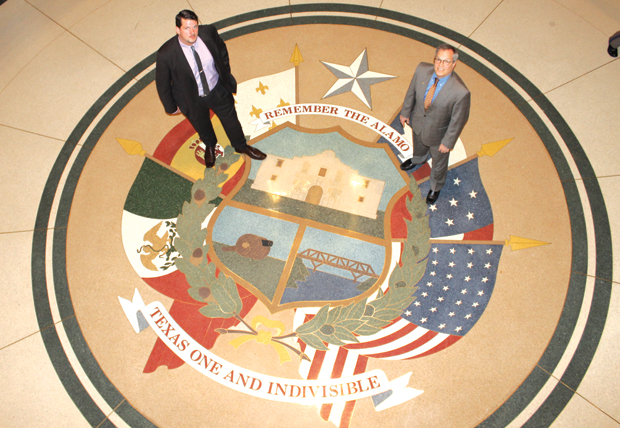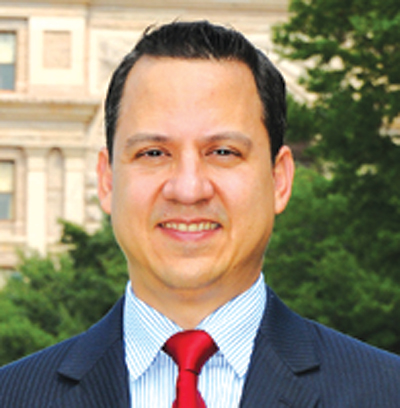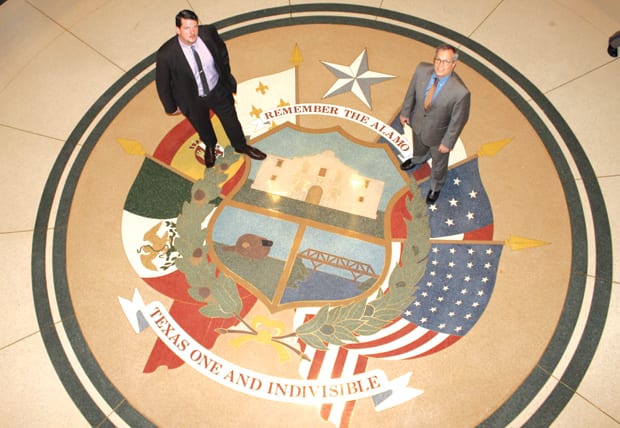LGBT advocates say fresh faces and changing attitudes could mean success for pro-equality bills in the 83rd Texas Legislature

READY TO ROLL | Executive Director Chuck Smith, right, and field organizer Daniel Williams head up Equality Texas’ lobbying efforts. (Anna Waugh/Dallas Voice)
AUSTIN — National momentum combined with a huge influx of freshman lawmakers — including an openly LGBT one — could mean success for pro-equality bills in the 83rd Texas Legislature, advocates say.
With 41 incoming representatives and six incoming senators — the highest number of freshmen in four decades — state LGBT advocacy group Equality Texas expects the changes to shake up views in the Capitol.
“That’s a lot of people who have not had time to form opinions. We’re going to talk to them now,” Equality Texas field organizer Daniel Williams said. “It’s been 40 years since we’ve seen this much change in a session. We will be surprised what happens. Everyone will be surprised by what happens.”
Among the freshman lawmakers will be El Paso’s Mary Gonzalez, the first openly LGBT female to serve in the state Legislature.
Although Gonzalez wants to focus on issues facing her district, she’s also looking forward to speaking out for equality.
“I think I will have an authentic voice because I’ve already shown my desire to have an authentic conversation about issues impacting our community,” she said. “I think that authenticity is really important in trying to get people to come to your side.”
Equality Texas Executive Director Chuck Smith said Gonzalez’s presence could persuade some lawmakers to support legislation that affects one of their own.
“It makes the issues we’re talking about relevant to one of their colleagues,” he said. “It’s not an other [people’s issue] anymore because it’s one of their members.”
Denis Dison, spokesman for the Washington, D.C.-based Gay and Lesbian Victory Fund, said relationship recognition legislation — including domestic partner benefits — has never passed a state legislature that lacked an out member. He said Gonzalez will have an impact because the Legislature hasn’t had an out member since Austin’s Glen Maxey left in 2003.
“When they’ve talked about these issues, there’s been nobody to stand up and say, ‘You’re talking about me.’ Mary will be able to do that,” Dison said. “While it still may take time and it may take more out legislators to begin to change what’s acceptable in the body, you have to start somewhere. Mary is obviously confident and outspoken and is not afraid to talk with people.”

ENEMY NO. 1 | Jonathan Saenz, president of the anti-gay Texas Values, said his group expects ‘the homosexual lobby to attack any and every section of Texas law that is related to how we define and protect marriage, family, mother and father references, parents, and male and female references.’
When the Legislature convenes on Jan. 8, the GOP state House majority will be 95-55, dropping from 102-48 in 2011. The state Senate will likely keep its 19-12 Republican majority, as a special election set for Jan. 26 to replace District 6’s late Mario Gallegos, D-Houston, is expected to go to a Democrat. Keeping the numbers at 19-12 will prevent a Republican two-thirds supermajority that would allow them to bring any legislation to the floor for consideration.
While lawmakers are expected to focus heavily on the budget, education and healthcare, Equality Texas’ agenda will include HB 238, which would ban anti-LGBT employment discrimination, and HB 201, which would allow same-sex parents to sign supplementary birth certificates for their adopted children.
HB 226 and SB 73 have also been filed and would prohibit discrimination in insurance based on sexual orientation and gender identity.
Other expected pro-equality bills include one to facilitate the change of gender markers on state identity documents, one to repeal the state’s marriage amendment and one to remove the Homosexual Conduct Law from the Penal Code after it was declared unconstitutional in 2003 in Lawrence v. Texas. A bill that would offer domestic partner benefits to employees of the University of Texas and Texas A&M University systems and one that would fix the discriminatory “Romeo and Juliet law,” allowing the age-appropriate dating defense to apply to gay teens, are also likely to be filed again.
Although Equality Texas will welcome some changes in the makeup of the Legislature, the organization’s leaders are hoping at least one thing stays the same.
House Speaker Joe Straus, R-San Antonio, a moderate who is likely the most LGBT-friendly speaker Texas has ever seen, is again facing a challenge from the right.
Straus is believed to have enough votes to fend off Rep. David Simpson, R-Longview. But Smith said if Straus somehow loses, it’ll shake up committees and could put Equality Texas’ endorsed bills at risk.
If the speaker changes, Smith said the organization will have to change its strategy.
“Since being the speaker, he’s always said he would operate in a way to allow issues to come forward,” Smith said of Straus. “In allowing everyone’s issues to see the light of day, our issues have gotten committee hearings.”
‘Anything is possible’
When last session’s anti-bullying bills passed, Equality Texas called them the first pro-equality bills to pass in Texas since hate crimes legislation in 2001, even though the LGBT-specific protections were edited out before passage.
Still, the organization’s leaders said the times are changing and legislators are listening to their constituents, of which a growing number favor LGBT rights.
An October University of Texas/Texas Tribune poll showed 69 percent of Texans support legal recognition — either marriage or civil unions — for same-sex couples, which was the highest percentage since regular polling on the issue began in 2009.
“Texas values are, let people live their lives without interference whenever possible,” Williams said. “We’re seeing an increasing vocal majority of Texans that believe systematic oppression of LGBT Texans is out of line with Texas values.”
In addition, several pro-equality bills have had committee hearings and have been explained to legislators before.
State Rep. Mike Villarreal, D-San Antonio, who filed the HB 238 to ban anti-LGBT job discrimination, said this is the sixth time he’s filed the legislation. And while Republicans still control the majority, he’s seen improvement in some conservative minds.
“Once again Republicans will control the Legislature, making it a challenge to pass this kind of legislation. However, as each year goes by, I’ve seen legislators warm up to this idea,” Villarreal said. “This may not be the session that it happens, but we’re definitely getting closer. We need enough Republicans to believe that a vote for this bill will help them in a general election and won’t hurt them in the Republican primary.”
State Rep. Garnet Coleman, D-Houston, who has filed a bill each session to repeal the 2005 constitutional marriage amendment and plans to do so again, acknowledged that LGBT issues are still controversial in Texas.
But Coleman added: “The public point of view is slowly changing, and that’s a good thing. I believe there’s a mood change.”
Coleman plans to again file a bill this session to repeal the Homosexual Conduct Law from the Texas Penal Code. The law was declared unconstitutional by the U.S. Supreme Court in the 2003 case Lawrence v. Texas, but remains on the books. He said some issues take time and more publicity before they’ll finally pass, adding that anti-bullying legislation took 10 years to pass and only did so after nationally publicized suicides, making it clearly “time for the bill.”
“It’s a rough road,” Coleman said. “You have to start somewhere.”
Since the nondiscrimination bill has been filed so many times before, Williams said conservatives have been able to review it in committee, despite it never making it to the floor for a vote.
But he said this session’s changes could make the bill a success, especially with the increased number of city ordinances that offer the protections.
“I think it would be a mistake to write this bill off. Anything is possible,” he said. “As helpful as municipal ordinances can be as far as establishing policy, it can’t get you your job back.”
In October, state Sen. John Carona, R-Dallas, came out in support of nondiscrimination protections in employment in an interview with Dallas Voice, making him one of the first Republicans in Texas to support pro-equality legislation. Carona also voiced support for the accurate birth certificate bill and offering domestic partner benefits to state university employees.
State Rep. Rafael Anchia, D-Dallas, who filed the birth certificate bill for the third time said the fate for his bill is unknown because of the different makeup this session, but recent national progress on LGBT issues could help.
“You see momentum at the national level and you wonder if that’s going to be carried through the state level. You wonder if people are still in an anti-equality frame here in Texas,” Anchia said. “I always think we’re hopeful that people will have an open perspective on equality issues.”
The conservative group Texas Values has targeted Anchia’s bill, claiming it would remove “mother” and “father” from all birth certificates. But the bill would only remove language added in 1997 that required one man and one woman to sign the supplementary birth certificates of adopted children. PolitiFact Texas, a nonpartisan fact-checking project, called the claims of Texas
Values “mostly false” because a state agency was unsure how it would implement the bill if passed. Anchia called the coverage positive and was glad it placed his bill in a positive light.
“I’m hopeful people will review the bill on its merits and not listen to the intentionally misleading claims made by its opponents,” he said.
‘You need to be vigilant’
Last session, a bill to ban transgender marriage failed to make it to the Senate floor for consideration. A measure that would have banned LGBT resource centers on college campuses failed in the House.
But anti-gay bills are anticipated this session as well. In November, state Sen. Dan Patrick, R-Houston, requested an opinion from Texas Attorney General Greg Abbott on whether government entities that offer employees domestic partner benefits violate the marriage amendment.
Texas Values filed a brief in December arguing that offering DP benefits is illegal. When asked if the organization would support any anti-gay bills and what its outlook on the session was, President Jonathan Saenz said “we expect the homosexual lobby to attack any and every section of Texas law that is related to how we define and protect marriage, family, mother and father references, parents, and male and female references.”
“We also expect the homosexual lobby to ask for special rights for so-called gay, bisexual, lesbian, transgender, pansexual, cisgender and the growing list of classifications that seem to be an expression of who a person chooses to have sex with or how they feel on a given day,” Saenz said.
While a negative opinion from Abbott wouldn’t make DP benefits illegal, it could help push through legislation targeting them.
“It’s generated a big discussion, and the senator’s interpretation with how it might conflict with what’s in our Constitution is inaccurate,” Smith said.
Williams said Patrick’s request is “so far out of the mainstream view” and the organization will lobby to keep local decisions with “local officials who know the need at the local level.”
While Gonzalez will be an advocate for pro-equality bills, she’s also prepared to stop anti-LGBT bills from gaining momentum, especially since the city of El Paso and El Paso County offer DP benefits and she doesn’t want her constituents to lose them.
“I would just continue taking the lead of my city in making sure that we keep domestic partner benefits. We’ve already taken all these steps forward. The last thing I want to do is for Texas to take steps back,” Gonzalez said. “I think it’s really important for my district and for the state that we have an environment that makes everyone feel equal and part of our community.”
Anne Wynne, chair of the Equality Texas Board of Directors, noted that no anti-gay bills have passed since the marriage amendment in 2005, and Equality Texas hopes to keep it that way.
“We’ll make sure the [anti-gay] bills go nowhere and focus on the bills that we want to go somewhere,” Wynne said.
Anchia said anti-gay legislation could always be an issue in the Legislature and constituents should pay attention to the bills their representatives are working on and supporting.
“You need to be vigilant to gauge whether or not negative legislation has a chance of passing,” he said. “I’m hoping that as a Legislature we’ll focus more on expanding rights rather than curtailing them.”
‘The currency of the Capitol’
Equality Texas is tweaking its strategy this session, bringing in more community engagement for its Lobby Day on March 11 and reaching out early to new and returning lawmakers.
In addition to the Equality is Good for Business program that engages businesses that already have LGBT-inclusive nondiscrimination policies, the organization launched stories of LGBT
Texas families who are affected by current laws with Reel Texas/Real Lives.
“The key is to go in and talk about how the law affects you and people you love,” Williams said. “It’s personal stories that are the currency in the Capitol.”
Lobby Day will be different this year as the organization will have team leaders organize groups of people to attend, so there are fewer people coming alone and will increase participation with larges groups in attendance.
For Smith, who took over as executive director in November, this will be his first session as head of the organization, but it’s his fifth session as a lobbyist. This time, he’ll balance fundraising with lobbying. Smith is looking to expand the Equality Texas team by bringing in a major gifts officer to help with fundraising.
He said organization is increasing grassroots efforts and public support, including a large push for citizens to contact and meet their representatives.
Smith said it’s vital that people visit their representatives and inform them what issues are important to them because many think they don’t have any LGBT constituents in their district.
“When lawmakers see them, it makes it real. Any of these issues have an impact on someone who lives in their district,” Smith said. “People should make no assumptions about who these people [legislators] are and what’s at their core.”
This article appeared in the Dallas Voice print edition January 4, 2013.













